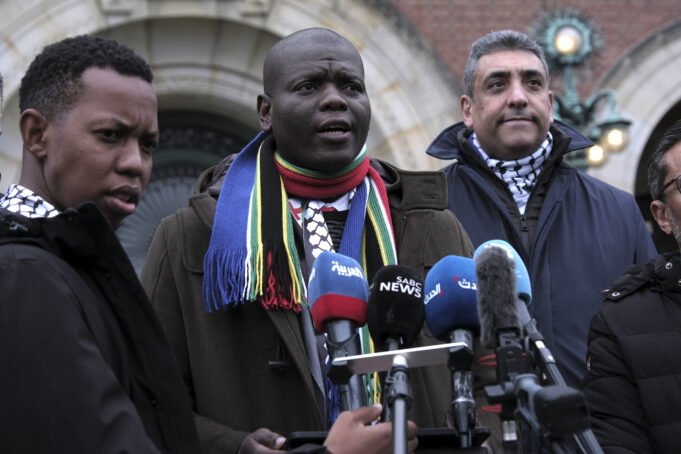South Africa’s legal team in the genocide case against the Zionist state of Israel at the International Court of Justice (ICJ) in The Hague arrived to a hero’s welcome where they were met with loud cheers of “Free Palestine” from throngs of pro-Palestine supporters at OR Tambo International Airport.
What a difference a court case makes. The birthplace of Nelson Mandela is now leading the world in the art of pursuing peace amid conflict. The country’s “morally upright position,” its geopolitical astuteness and honest and forthright commitment to the legacy of the father of post-apartheid South Africa’s promise to support the liberation struggle of the Palestinian people has dominated “international public discourse.”

This all occurred in the wake of the former apartheid state hauling the state of Israel—accused by Amnesty International of committing “apartheid”—into the ICJ on the charges of genocide against civilians in Gaza.
While the deliberations at the court could take years, South Africa, which filed the lawsuit, “is aiming for the ICJ to issue several interim orders, including requiring Israel to immediately suspend its military operation. A ruling on these “provisional measures” could be issued within weeks. Whether or not Israel would obey is another matter, reported +972 Magazine.
In South Africa’s case they charged Israel with deliberately and with intent violating the 1948 Convention on the Prevention and Punishment of the Crime of Genocide. Both South Africa and Israel are signatories of the convention.
While South Africa’s case against Israel was being tried at the ICJ, it’s also gaining momentum in the court of public opinion. Twenty-nine artists from around the world, including Hollywood actors, directors, filmmakers, musicians, and playwrights, including Charles Dance, Steve Coogan, Susan Sarandon, Inua Ellams, Aida El-Kashef, and Maaza Mengiste, read portions of the South African government’s formal complaint against Israel. “In just the course of a little more than a day, the videos of the recordings have been viewed by some 13 million people,” reported to wsws.org.
Add to that a group of 50 South African lawyers are preparing a lawsuit against the U.S. and the UK for complicity in Israel’s war crimes in Gaza. According to lead attorney Wikus Van Rensburg, the initiative “aims to prosecute those who are complicit in the crime in civilian courts in collaboration with lawyers from the U.S. and UK with whom he is already in contact,” reported news site aa.com.tr, which stands for Anatoly Ajansi.
Ironically, while the ICJ case against Israel is gaining momentum, “the Lemkin Institute for Genocide Prevention has been furiously pressing the International Criminal Court to indict Israeli Prime Minister Benjamin Netanyahu for the crime of genocide, the siege and bombardment of Gaza and the many expressions of genocidal intent, especially in his deleted tweet from 10/17/2023,” Dr. Binoy Kampmark, a senior lecturer in the school of Global, Urban and Social Studies at Rmit University in Melbourne, wrote on counterpunch.org.
According to Kampmark, “The tweet (or post) in question crudely and murderously declared that ‘This is a struggle between the children of light and the children of darkness, between humanity and the law of the jungle.’ If that does not reveal intent, little else will,” Kampmark continued.
In a program titled, “Israel’s Genocide Exposed by South Africa’s Devastating ICJ Case,” Owen Jones explained to his nearly 500,000 YouTube that, “understandably” people might be “cynical” about the prospects of such an “outcome” as Israel being found guilty. “Surely Israel would simply ignore the case as it has done before when the court has ruled (in the past) against it,” Jones said.
“But if Israel is found to be committing genocide that would then have huge implications for the states (like the U.S. and UK) which arm and back Israel. And without their support Israel’s genocide against the Palestinians would not be possible,” he added.
To some, the outcome of the case within the politics of the ICJ may be less than hopeful.
“Even if the United States doesn’t use its UN veto … an interim order from the ICJ is likely to cause Israel serious problems. The U.S. vetoing the ICJ outcome would only come with such a resolution while imposing a significant cost on Israel in order to justify doing so,” according to Meron Rapport, former-head of the news department at Haaertz,
“There is such a thing as an international legal ‘deep state.’ Jurists and judges listen to what important courts say. And when the ICJ, also known as the World Court, makes its rulings, national courts in most of the Western world take note. Therefore, if the ICJ rules that there is a danger of genocide being committed, I can imagine a British citizen turning to a British court and demanding that the UK cease trading arms with Israel. Another implication is that such an ICJ ruling would likely force the ICC’s chief prosecutor [Karim Khan] to open an investigation of his own,” he added, referring to the International Criminal Court.
Follow @JehronMuhammad on X, formerly Twitter













